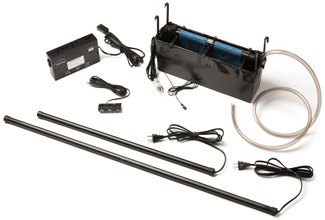Humidity Control
 Why is it important to control the humidity inside the piano?
Why is it important to control the humidity inside the piano?
Your piano is made of many different types and sizes of wooden parts. These parts are sensitive to the relative humidity in the air, causing them to shrink and swell accordingly. This puts stress and strain on the parts, causing damage and changes in pitch in the instrument. Over time, the repeating cycle of shrink and swell can cause loose tuning pins, cracks in the soundboard and bridges and loosening of joints and screws. Damage to pin blocks, bridges and the soundboard are very expensive to repair and can in many cases be cost prohibitive. The Dampp Chaser Piano Lifesaver eliminates these problems.
 Installed in the piano, it precisely keeps the humidity inside the piano at the ideal level of 42%, minimizing the shrink/swell of the wood maintaining tuning stability and damage to wooden components.
Installed in the piano, it precisely keeps the humidity inside the piano at the ideal level of 42%, minimizing the shrink/swell of the wood maintaining tuning stability and damage to wooden components.
FAQ:
1. I have a whole house humidifier and air conditioning. Isn’t that good enough?
A: These systems will certainly help. However, the fluctuations in weather cannot be compensated for precisely enough. Try keeping your house at 42% in winter. Typically you will find condensation on the windows and walls at this level. The same is true in the summer with humidity. The only way to keep the piano in a consistent state is with the Dampp-Chaser.
2. These systems seem expensive. How will I recoup the cost?
A: The repairs that will become necessary over time can easily exceed the value of the piano. in addition, the stability of the piano will make tunings hold better and result in easier tuning.
Costs do vary with the configuration and size of the piano. Please contact me for a specific quote.
Recent Comments